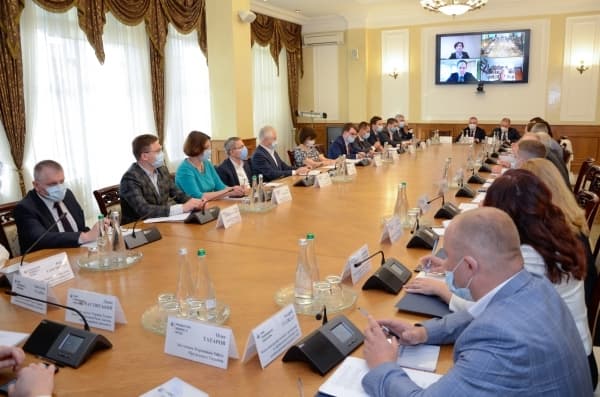Panel head blocks appointment of anti-graft prosecutor, wants SBU to check winner


A selection panel failed to nominate a new chief anti-corruption prosecutor for the second time on Dec. 24, triggering indignation among civil society.
Kateryna Koval, head of the panel, demanded that the Security Service of Ukraine (SBU) and other state agencies conduct a second background check on Oleksandr Klymenko, who won the contest for the job. Koval didn't respond to the request for comment.
Klymenko - like all other candidates - has already passed a background check. Anti-corruption activists say that a second background check would be unlawful and that it is just the latest attempt by pro-government panel members to block the appointment of an independent prosecutor.
Klymenko passed all stages of the selection process and got the highest score. However, pro-government panel members refused to vote for his appointment on Dec. 21.
The latest developments follow months of delays in the selection of the chief anti-corruption prosecutor. Pro-government members of the selection panel have disrupted numerous panel meetings since 2020 by failing to attend.
Anti-corruption activists have accused the President’s Office of sabotaging the selection process because it does not want an independent prosecutor.
"(President Volodymyr) Zelensky and (his chief of staff Andriy) Yermak are blocking the appointment of a chief anti-corruption prosecutor again through the selection panel members that they control," Vitaly Shabunin, head of the Anti-Corruption Action Center's executive board, wrote on Facebook.
Zelensky has denied the accusations of sabotaging the contest previously. Yermak did not respond to requests for comment.
The chief anti-corruption prosecutor oversees all cases pursued by the National Anti-Corruption Bureau of Ukraine (NABU). The selection of an independent professional who is free from political influence has been a key requirement of Ukraine’s Western partners and donors.
Background check
The panel that chooses the anti-corruption prosecutor consists of four international experts and six members delegated by parliament.
The panel’s head, Koval, has argued that Klymenko should be nominated as the chief anti-corruption prosecutor only if the selection panel receives confirmation that his appointment complies with the anti-corruption, lustration and state secret laws. She said that she sent a request to the Prosecutor General’s Office and demanded a second background check on Klymenko.
“Koval read a draft decision (on Klymenko's appointment) written in a way that makes the appointment of the chief anti-corruption prosecutor impossible,” Shabunin said, as cited by the Anti-Corruption Action Center.
The National Agency for Corruption Prevention said that there are no legal grounds for a second background check on Klymenko.
Olena Shcherban, a legal expert at the Anti-Corruption Action Center, told the Kyiv Independent that Koval's aim was to delay the appointment indefinitely since Prosecutor General Iryna Venediktova might tell the panel that Klymenko has already passed a background check and refuse to give this information for a second time.
Koval's proposal led to heated debates between pro-government and international panel members.
Drago Kos, one of the international members, told Koval at the meeting that she had applied to get information on Klymenko exactly because she knew she would not receive it.
Shcherban said that the authorities may also try to strip Klymenko of access to state secrets and thus block his appointment.
All international panel members voted for Klymenko’s appointment without a second background check, while most pro-government members voted against it.
Then the panel members attempted to find a compromise in the wording of the document on Klymenko’s nomination.
All international panel members and four out of six parliamentary members voted for it. However, it was still short of the required minimum of five parliamentary member votes.
Previous delays
Klymenko, a NABU detective, got 246 points, beating prosecutor Andriy Synyuk, who got 229.
The Anti-Corruption Action Center has praised Klymenko for investigating top officials, including Zelensky’s deputy chief of staff Oleh Tatarov. Activists raised concerns about Synyuk’s independence since he is a direct subordinate of Prosecutor General Venediktova.
As one of the reasons for not voting for Klymenko’s appointment, the selection panel previously referred to a Dec. 20 decision issued by the Kyiv District Administrative Court, headed by Ukraine’s most infamous judge Pavlo Vovk.
The court ruled to cancel the rules of procedure for selecting the anti-corruption prosecutor and shut down the selection process. The court claimed that the selection panel allegedly had no legal authority to adopt the rules of procedure.
The Anti-Corruption Action Center argued that the court ruling makes no sense because there is a law explicitly giving the selection panel the necessary powers.
The court did not respond to a request for comment.
Since Kyiv District Administrative Court is the court of first instance, its decisions do not take legal effect until an appellate court upholds them.
The developments have prompted a backlash from Ukraine's foreign partners.
Daniel Langenkamp, a spokesman for the U.S. embassy in Ukraine, told news agency Liga.net on Dec. 23 that the embassy is deeply disappointed with the panel’s inability to appoint the chief anti-corruption prosecutor. He argued that there are no grounds not to sign off on the winning candidate’s appointment.










